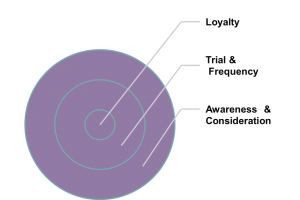Trying to Build Your Brand? Don’t get stuck with flicked customers. Fickle-ed means they will leave for a $1 discount, 2 for 1 promotion , or something a little prettier.
The best customers are out there….you just need to lead them to areas where your brand shines….its the path to loyalty. This process is what I call the loyalty continuum. Each step along the way is an opportunity to drive real brand momentum–maybe its an trial offer or the kind of actions or behavior that uncovers the best repeat customers or prospects.
 Loyalty is the ultimate goal of marketers and it should be on the minds of anyone managing brand or new venture. It is often said that 80% of your company’s profits will likely come from the top 20% of your customer base. Another name for the top of that 20% is loyalists. Loyalists talk up their brand, actively engage in promotions or brand activities and rarely switch or move even if discounts or incentives are offered. They give back in the form of spending more of their share of wallet and through referrals. In higher education, loyalists are the alums that go to homecoming and give back year after year. They go to the reunions and keep up with their former classmates even when it is years after they graduate.
Loyalty is the ultimate goal of marketers and it should be on the minds of anyone managing brand or new venture. It is often said that 80% of your company’s profits will likely come from the top 20% of your customer base. Another name for the top of that 20% is loyalists. Loyalists talk up their brand, actively engage in promotions or brand activities and rarely switch or move even if discounts or incentives are offered. They give back in the form of spending more of their share of wallet and through referrals. In higher education, loyalists are the alums that go to homecoming and give back year after year. They go to the reunions and keep up with their former classmates even when it is years after they graduate.
Moving prospects from unaware to awareness is an advertising and social media challenge. In marketing Monmouth College, direct mail to prospects is the traditional route for generating awareness among graduating high school seniors, but today most research on college is done online by the prospects themselves and most importantly, their parents.
Once a college prospect is aware of your brand, you should consider the best strategies and tactics for getting into their consideration frame. The consideration frame is the “short list” of colleges the prospect wants to consider. Another way to describe consideration frame are the the finalists in their wish list.
The next step is generating trial. Trial is most often a virtual tour, visit with an admissions rep or faculty member on the phone. The campus visit is the preeminent step in trying your school out to see if it “feels right” or “fits”. At this point you will begin to see real benefits from your marketing intiatives. Before you achieve true loyalty you need prospects to establish certain behaviors or pattern of brand perference. Many loyalty programs are built on the premise that the repeat/frequency phase is the most important link to loyalty because its establishes paterns of behavior (plus the financial payback begins from all of your marketing investments).
Repeat/frequency behaviors might mean coming up with an anti-melt strategy if you are an institution of higher learning. The ultimate objective is loyalty and word-of -mouth advertising and social media “pin-action” . Using the example of marketing Monmouth College, loyalty usually results in a current student or alum recommending Monmouth College to a friend or associate.
Brands should plan promotions and incentives for each step in the continuum so that a fresh supply of new prospects is maturing into loyalists one step at a time. It takes effort to manage these activities and measurement devices to monitor the development of prospects along the continuum. My job at Monmouth was to take what we had spent in the past and maximize the impact. How a CMO handles these challenges varies dramatically by college. Each university must distinguish its unique benefits, programs or faculty to get attention. In higher education it a common practice to copy oneself after an aspirational peer. In Clay Christenson’s new book on innovation in Higher Education, he is highly critical of any college that copies the Harvard model since Harvard developed into an institution with few market constraints. Harvard, with its multi-million dollar endowments in virtually every major school has few financial limitations. For the rest of us, we face the reality that our institution could be marginalized or completely destroyed (or squeezed) by pressure to follow the Harvards from above and the online/for-profit colleges or community colleges below.
In higher education, a proven marketing principle is that a high perceived value translates into brand preference and goodwill. The brand value equation provides a meaningful model that helps us understand how to build that goodwill. Ultimately the marketing plan, resources available, execution and learning from results determine the success of your marketing program. Marketing criteria and milestones established in the college’s business plan will become your recipe for brand momentum and success.
Prior to beginning any marketing plan I recommended that the institution conduct professional quality research on the key stakeholders and prospects (and their parents!) that look at your college but decide to go eleswhere.
The problem most institutions face is that marketing themselves is inherently repugnant to academics. For academics, marketing and advertising smacks as manipulation and “spin”.
Even the task of market planning requires colleges to do something that is not natural; to look at the mirror and admit your flaws or accentuate your strengths. Traditional universities were not designed to brand distinctively or address metrics of quality as benefits. Most want to be like Harvard, Stanford or Carlton. Christensen would say these institutions are trying to follow the Harvard model. He believes that trying to be all things to all people in higher education is often a way to unwisely invest in “me-too” strategies which are often misguided.
But starting a distinctive marketing program is not easy. Simply promoting a quality program in business or prominant faculty is like telling prospects you offer a “quality educational experience”—everyone says the same thing. Large universities offer wonderful facilities and sports programs, but do not successfully educate students around their individual and distinct needs.
If your goal is to attract prospects to your college you need to explain the value proposition. The value proposition is the value of the college program degree less the cost to get that diploma. If graduates consistently land their desired jobs and get into prestigious graduate schools you will not need to convince prospects to take a closer look at your school. The evidence and word of mouth will help the programs sell themselves. Today, parents and prospects look around a colleges web site, its program offerings , and decide if it is worth of consideration even before they speak to an admissions rep or faculty member. It is our job to convince them to visit campus (trial). If the prospects live far from the college, your job will be tougher. No matter what their incoming academic achievements, you will need to convince them that they will be a better off, gain more internship/ job prospects, get smarter, and be more capable of handling leadership opportunities when they graduate–otherwise or you will fail in your efforts to generate more word of mouth, social media, and most importantly, campus visits.
In our case, we are a small college so we had an advantage of taking time to learn as much as we could about each individual prospect and their parents. We customized our approach and campus tour to their specific interests and our strengths. Asking larger, more selective universities to customize their admissions process, let alone marketing something distinctive and memorable is challenging. We do it everyday because we have to.
Becoming a “great college” for Monmouth was a long-term objective that involved getting everyone to believe our central message. Our focus on business and science in the context of liberal arts was unique so we created a campaign to reinforce our strong position in both disciplines . We backed up that commitment by raising money and building a $40 Million Dollar Center that combines the study of science and business. We interviewed close to 100 alumni working in both those areas and focused our promotion efforts on those that were successful in combing both.
Focusing on both alumni and student success represented a seismic shift in how Monmouth and higher education, broadly speaking, will measure high quality programs. Its a move away from the traditional focus on US News rankings or following the great research and knowledge creation universities such as Harvard. Our focus on teaching, active learning and smaller classes moves the Monmouth brand benefits towards an expertise in active learning and knowledge proliferation.
So at the end of the day, the success of your college is still depended on making new prospects aware of your brand, and getting them to seriously consider a visit. The loyalty contiuum works for all companies and non-profits too-everyone needs new customers.
But to be truly successful you will need to move prospects down that continuum to the place where all of that marketing investment pays off– loyalty.

